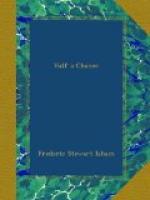John Steele stirred; the whispering ceased. My lord turned the last page; the girl rose and bent for an instant her fair head. And as Steele looked at her, again there came over him—this time, it may be, not without a certain bitterness!—an impression of life and its joys—spring-tide and sunshine, bright, remote!—so remote—for him—
A babel of voices replaced melody; the people got up. A number lingered; many went, after speaking to their hostesses and Sir Charles. John Steele, at the rear, looked at the door leading into the main hall toward the young girl, then stepped across the soft rugs and spoke to her. She answered in the customary manner and others approached. He was about to draw back to leave, when—
“Oh, Mr. Steele,” she said, “my uncle wishes to see you before you go. He was saying he had some—”
“Quite right, my dear!” And Sir Charles, who had approached, took John Steele’s arm. “Some curious old law books I picked up to-day at a bargain and want your opinion of!” he went on, leading the other into a lofty and restful apartment adjoining, the library. Steele looked around him; his gaze brightened as it rested on the imposing and finely bound volumes.
“You have a superb collection of books,” he observed with a sudden quick look at his host.
“Yes; I rather pride myself on my library,” said Sir Charles complacently. “Lost a good many of the choicest though,” he went on in regretful tones, “some years ago, as I was returning to Australia. A rare lot of law books, a library in themselves, as well as a large collection of the classics, the world’s poets and historians, went down with the ill-fated Lord Nelson.”
“Ah?” John Steele looked away. “A great mart, London, for fine editions!” he said absently after a pause.
“It is. But here are those I spoke of.” And Sir Charles indicated a number of volumes on a large center table. John Steele handled them thoughtfully and for some time his host ran on about them. A choice copy of one of the Elizabethan poets, intruding itself in that august company, then attracted Steele’s attention; he picked it up, weighed and caressed it with gentle fingers.
“Who shall measure the influence of—a little parcel like this?” he said at length lightly.
“True.” Sir Charles’ eye caught the title. “As Portia says: ’It blesseth him that gives and him that takes.’ Excellent bit of binding that, too! But,” with new zest, “take any interest in rare books of the ring, full of eighteenth century colored prints, and so on?”
“I can’t say, at present, that the doings of the ring or the history of pugilists attract me.”
“That’s because you’ve never seen an honest, hard-fought battle, perhaps?”
“A flattering designation, I should say, of the spectacle of two brutes disfiguring their already repulsive visages!”
“Two brutes?—disfiguring?”—the drawling voice of Lord Ronsdale who had at that moment stepped in, inquired. “May I ask what the—talk is about?”




